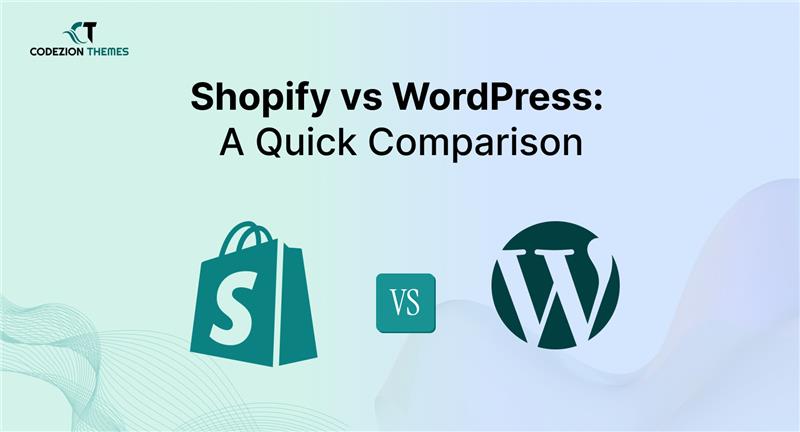Shopify vs WordPress: A Quick Comparison for Ecommerce Success
Explore the key differences between Shopify and WordPress for ecommerce. Learn about Shopify ecommerce and WordPress ecommerce solutions to make an informed choice for your online store.
Introduction
When it comes to building an online store, two major platforms dominate the space: Shopify and WordPress. Both are incredibly popular, but each platform serves different needs, depending on the goals of the user. In this article, we will explore the Shopify vs WordPress debate, focusing on their unique features, benefits, and drawbacks, especially in the context of ecommerce.
Whether you’re looking to launch a small boutique store or build a comprehensive online marketplace, understanding the difference between Shopify and WordPress is essential for making the right choice. This blog will provide a side-by-side comparison, giving you all the tools you need to make an informed decision.
What is Shopify?
Shopify is a cloud-based ecommerce platform designed specifically for building online stores. It allows users to create, manage, and scale an ecommerce business without needing extensive technical knowledge. Shopify provides all-in-one solutions for hosting, designing, and managing product inventories, making it an attractive option for those who want a hassle-free and streamlined experience.
- User-friendly interface: Easy to use, even for beginners
- Customizable themes and templates: Offers a variety of pre-designed templates.
- Built-in ecommerce tools (secure payments, inventory, shipping): Secure payments, inventory management, shipping integrations, and more.
- Extensive app ecosystem: Thousands of apps to extend functionality.
- 24/7 customer support: Assistance when you need it most.
What is WordPress?
WordPress, on the other hand, is the most popular content management system (CMS) in the world. Originally created as a blogging platform, WordPress has evolved into a powerful platform capable of handling everything from personal blogs to complex ecommerce websites. While it requires more setup and configuration than Shopify, it offers complete freedom and flexibility.
- Open-source and free to use: Free to use and customizable.
- Large plugin ecosystem: Thousands of plugins to extend functionality.
- Highly customizable themes: Both free and premium themes available.
- SEO-friendly out of the box: Great for search engine optimization.
- Scalable from blogs to enterprise sites: Suited for any type of website, from simple blogs to large ecommerce sites.
Shopify vs WordPress for Ecommerce: Which is Better?
When comparing Shopify vs WordPress for ecommerce, it’s important to understand that both platforms can create successful online stores. However, they cater to different needs. Shopify excels at simplicity, providing a managed, easy-to-use platform for users who want an all-in-one solution. WordPress, on the other hand, offers greater flexibility and customization, ideal for users who want control over every aspect of their store.
Shopify Ecommerce
- Shopify is purpose-built for ecommerce, making it the go-to choice for entrepreneurs who want to focus on selling without worrying about technical issues.
- It handles everything from payment processing to shipping, ensuring a smooth experience.
- Shopify’s transaction fees can add up, but the benefits of its simplicity outweigh the costs for most users.
WordPress Ecommerce
- WordPress is not an out-of-the-box ecommerce solution, but with plugins like WooCommerce, it can easily become a full-featured ecommerce platform.
- It offers more customization and flexibility compared to Shopify, allowing for intricate designs, advanced features, and SEO-friendly content.
- The downside of WordPress ecommerce is the learning curve, and you must manage your own hosting, security, and maintenance.
Shopify Ecommerce: Advantages and Limitations
Advantages
- Simplicity: Shopify is a fully managed platform, which means you don’t have to worry about hosting, security, or updates. Everything is taken care of for you.
- Fast Setup: Setting up an online store with Shopify is incredibly fast and requires minimal technical knowledge.
- App Store: Shopify has an extensive app store, allowing you to easily integrate additional features and functionality to your store.
- Customer Support: Shopify’s 24/7 support team can help you solve any problems you encounter.
Limitations
- Cost: Shopify’s pricing starts at $29 per month, with additional costs for themes, apps, and transaction fees.
- Limited Customization: While Shopify is customizable, it does have some limitations compared to WordPress.
- Transaction Fees: Shopify charges a fee for every transaction unless you use their own payment system, Shopify Payments.
WordPress Ecommerce: Advantages and Limitations
Advantages
- Flexibility: With WordPress, you can fully customize your store’s design, features, and functionality to suit your needs. You can use plugins like WooCommerce to add ecommerce capabilities.
- SEO-Friendly: WordPress is known for its SEO capabilities, making it easier to optimize your site for search engines and increase organic traffic.
- Cost-Effective: WordPress itself is free to use, and you only need to pay for hosting and premium themes or plugins, making it a more affordable option for some users.
Limitations
- Learning Curve: WordPress requires more technical knowledge, especially if you want to take full advantage of its customization options.
- Maintenance: You need to manage your hosting, security, and software updates, which can be time-consuming.
- No Built-in Ecommerce: WordPress does not come with built-in ecommerce features, so you need to install and configure WooCommerce or other ecommerce plugins.
Key Differences Between Shopify and WordPress
When it comes to choosing between Shopify vs WordPress, here are some key differences:
| Feature | Shopify | WordPress |
|---|---|---|
| Ease of Use | Extremely user-friendly, minimal setup | Requires some technical knowledge |
| Customization | Limited to themes and apps | Fully customizable with plugins |
| Cost | Subscription-based, plus transaction fees | Free, but hosting and premium plugins cost extra |
| SEO | Basic SEO features | Advanced SEO customization options |
| Ecommerce Tools | Built-in ecommerce features | Requires plugins like WooCommerce |
| Maintenance | Managed hosting, automatic updates | Self-hosted, manual updates |
| Support | 24/7 customer support | Community support, paid support options |
| Scalability | Scales well with additional plans | Highly scalable with customization |
Which Platform is Best for You?
Choosing between Shopify vs WordPress for ecommerce ultimately depends on your business needs:
- Choose Shopify if you want an easy-to-use, all-in-one platform that handles everything for you. It’s perfect for those who don’t want to spend time on technical aspects and prefer simplicity and efficiency.
- Choose WordPress if you need full control over your website’s design, functionality, and scalability. It’s ideal for those who have a bit more technical expertise or want to create a highly customizable and SEO-friendly store
Conclusion
In the Shopify vs WordPress debate, both platforms offer distinct advantages. Shopify is a powerful, easy-to-use solution for those focusing on ecommerce, while WordPress offers greater flexibility and customization for those who need more control over their site. Whether you choose Shopify or WordPress depends on your level of technical expertise, budget, and business needs.
FAQs
1. Which platform is better for a beginner: Shopify or WordPress?
Shopify is more beginner-friendly as it’s designed to be easy to use, with minimal setup required.
2. Can I use WordPress for ecommerce?
Yes, WordPress can be used for ecommerce with plugins like WooCommerce, but it requires more setup compared to Shopify.
3. Which is more cost-effective: Shopify or WordPress?
WordPress can be more cost-effective as it’s free, but you will need to pay for hosting, plugins, and themes. Shopify charges a monthly fee with additional costs for apps and transaction fees.
4. Is SEO easier with Shopify or WordPress?
WordPress is known for its strong SEO capabilities and offers more customization, while Shopify provides basic SEO tools but with fewer options for advanced optimization.
5. Which platform offers better customer support?
Shopify offers 24/7 customer support, while WordPress relies on community support or paid services for assistance.


